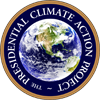PCAP Releases their Updated Action Plan
|
On eve of presidential debate, leading climate think-tank details ways for
The report from the Presidential Climate Action Project (PCAP) details 10 recommendations on how the next president can develop solutions to the nation’s energy and climate change problems, even if Congress is deadlocked or dysfunctional. “Past presidents have used their executive powers aggressively to serve the public interest,” said PCAP executive director Bill Becker. “Today there are no more critical issues facing America than developing its clean energy technologies and preventing climate impacts that are still preventable.” In its report, PCAP describes a number of tools the next president will have at his disposal to reform federal policies that were created by and for a carbon-intensive economy. Of special concern, Becker said, are the many federal fiscal policies that contribute to energy and climate problems, including taxpayer subsidies given to fossil energy industries. “In addition to being mature and well-financed, these industries are the principal source of greenhouse gas emissions, which in turn are the principal cause of global climate change,” Becker said. “Our thought leaders in the military and intelligence communities tell us point-blank that fossil energy and climate change both threaten our national security as well as the environment. Why, then, do we require taxpayers to support oil, coal and gas companies?” The National Academy of Sciences already is completing work on a carbon inventory of the tax code, and PCAP recommends that the next president revive the National Commission on Fiscal Policy and Reform and instruct it to recommend tax provisions that should be eliminated, then identify other fiscal policies that should be reformed to support America’s transition to a clean energy economy. PCAP also recommends that the next president:
PCAP’s presidential action plan is the fifth it has issued since 2007. It is available online at: www.climateactionproject.com. The following members of PCAP’s advisory board are available for interviews today:
### |
|
The Presidential Climate Action Project was created in January 2007 to develop policy recommendations on climate and energy security, with a focus on what the President can accomplish using executive authority – in other words, without action by Congress. |
vvlx,
hentai,
xporn,
xnxx,
sex việt,
Family Practice Doctors Near Me,
Ratify Treaties,
Best Hookup Apps,
Brunch On A Wednesday,
Comfortzone,
Plaza Premium Lounge Orlando Reviews,
Catering 77002,
Cauliflower And Coconut Curry,
Usa Rail Pass,
Active Duty Service Member,
Patch American Flag,
Farfetch Coupon Code,
Connect Google Mini,
Nike Mens High Top,
Bronny James Usc Basketball,
Anal Sex Prep,
Aesports,
Check Balance On Debit Card,
Add People Trustpilot,
Skype Ids,





